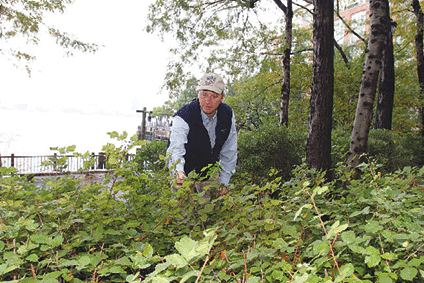By Lori Haught
When T Fleisher, director of horticulture at the Battery Parks City Parks Conservancy, proposed sustainable landscaping 17 years ago, some people looked at him like he “had two heads.”
“When we started, there was no one doing it,” he said. “Now it has become very fashionable.”
Fleisher, 48, said the trend toward more ecologically sound methods of gardening and building — he cited the surge of “green” buildings in B.P.C. in recent years — is natural as society has begun to realize the world has only limited resources that should not be abused.
The conservancy uses all the waste from the park and also collected waste like coffee grounds from Starbucks and pre-consumer waste from grocery stores to create two types of compost, bacterial and fungal, which are used as natural fertilizers. The bacterial compost is made up of the green plant waste and coffee grounds and is used on grass and flowers. The fungal compost is used on the trees and shrubs and is composed of the wooden plant waste and paper products.
Fleisher said the conservancy hasn’t chemically fertilized a tree or shrub in five years. They never use pesticides; instead they treat the root of the infestation problem, not the infestation itself.
“There is no way all this would have been done without the support of [the conservancy] and the Battery Park City Authority,” he said.
This pioneering approach is why Fleisher received the 2006 Silver Honorary Medal from the Massachusetts Horticultural Society, founded in 1829. He traveled to Wellesley, Mass. to accept the award. He was nominated for his contribution to organic practices of horticulture. He said that it was an honor to be recognized, especially by an organization outside New York State.
Although he received his bachelor of fine arts in music from Berklee College of Music, Fleisher said he has been involved in horticulture for years, even while at college.
“Horticulture is my calling,” Fleisher said. “I feel like I was meant to do that.”
He is no novice, either. He learned about soils, microbiology, and plant anatomy by taking classes, working with others and reading on his own. He started working professionally with Perennial Plantsman in 1982. In 1986, he began his own landscaping business, which focused on organic growing techniques. He began work at the conservancy in 1989.
Born in Washington D.C. as Eric T. Fleisher, he started going by T early on. He spent the first 13 years of his life in Scandinavia, where his father was in the U.S. Foreign Service, and said it was hard to adjust to English when he moved back to America because Swedish was his first language.
Fleisher said he has learned a lot about sustainability over the years.
“I thought I knew a lot when we started,” he said. “The more we got into it, we looked to the soil for answers.”
Fleisher started out with training in the anatomy of trees, shrubs and plant life, but quickly learned that the soil was the most important thing in a sustainable system.
“The soil is really a living system,” he said.
He said the natural microorganisms such as bacteria, fungi and protozoa create the ideal conditions for natural growth, as well as prevent pest infestations.
He said the lack of unnatural chemicals being put into the ground is incredibly beneficial to the community. It means that there are fewer chemicals in the water and also that children can be children and roll around in the grass without their parents fearing they’ll come in contact with harsh chemicals.
It is particularly important for Battery Park City, Fleisher said, because it is a community within a park and anything put into the ground or air will affect everyone living in the neighborhood.
Mike McCormack, one of the executive members of the Liberty Community Garden, said Fleisher helped the neighborhood gardeners get new topsoil and reopen after 9/11 and has been one of their biggest supporters, often giving them horticultural tips.
He still plays music too; sometimes B.P.C. locals can see him strum the guitar with his band, T Fleisher and the Threads. He said they often play right down the street from the conservancy’s office at the Gatehouse on the corner of South End Ave. and Albany St.



































